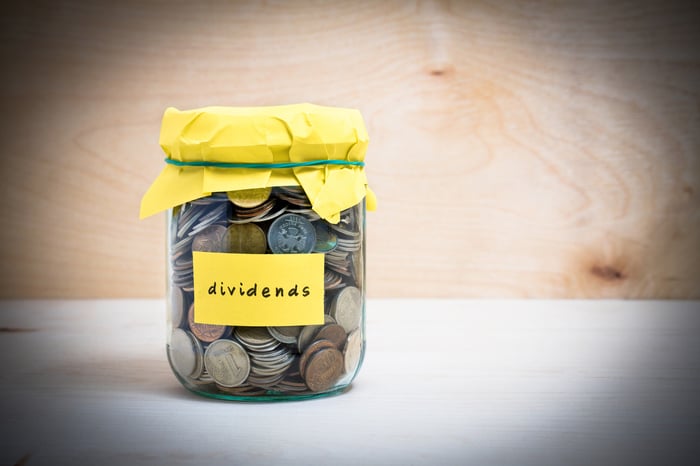Dividend stocks can be a great way for a retiree to supplement their income. However, not just any dividend payer will do. The payout needs to be sustainable through the market's inevitable downswings. Meanwhile, an ideal dividend would consistently rise over time since that would provide a retiree with a steadily increasing cash flow stream to help offset expense growth.
Three such dividend stocks that perfectly match these criteria are Canadian pipeline giant TC Energy (TRP 0.50%), residential REIT Equity Residential (EQR 0.42%), and renewable energy producer Brookfield Renewable (BEP -1.66%).

Image source: Getty Images.
A well-oiled dividend growth machine
While TC Energy operates in the turbulent energy sector, it's largely immune to the industry's issues. That's because 92% of its earnings have no exposure to fluctuations in volumes or commodity prices because of contractual agreements or government-regulated rates. It therefore generates very stable cash flow to support its 5.2%-yielding dividend.
Meanwhile, the company only pays out about 40% of its cash flow in dividends, enabling it to retain the rest to finance expansion projects. It also has one of the strongest balance sheets in the pipeline sector, providing it with additional funding flexibility.
TC Energy currently has a massive $43 billion Canadian ($32 billion) expansion program under way with projects that should start up through 2023. That gives it clear line of sight on future earnings growth. And that means it has high confidence that it can continue increasing its dividend, which it has done every year since 2000. In TC Energy's estimation, it can provide investors with an 8% to 10% raise next year and grow its payout by a 5% to 7% annual rate after that.
Steadily rising rent checks
Leading apartment owner Equity Residential currently pays an attractive 4.5%-yielding dividend. That payout is on solid ground. First of all, the company's rental income has proven to be highly resilient as it has collected 97% of its rent during this year's economic downturn. Meanwhile, it only pays out about 65% of its cash flow, a conservative level for a REIT. On top of that, it has one of the best balance sheets in the REIT sector.
That strong financial profile gives Equity Residential the flexibility to continue expanding its apartment portfolio. That should provide the company with more rental income, which would support a steadily higher dividend. Overall, the REIT has grown its payout by a 5% compound annual rate since 2010 and could continue increasing it by a similar rate in the future if it can keep acquiring apartments at attractive prices.
Renewable-powered dividend growth
Brookfield Renewable also pays an above-average dividend that currently yields 3.6%. It's also highly durable. For starters, the company sells about 95% of the renewable energy it produces to utilities and other end-users under long-term, fixed-rate power purchase agreements. It also has one of the strongest balance sheets in the renewable energy sector. So it's comfortable with a higher payout ratio, which will be around 87% this year.
However, that level should go down as Brookfield continues growing its portfolio and cash flow. The company currently expects to expand its cash flow by around 6% to 11% per year via a quartet of organic growth drivers, including a sizable development pipeline. Meanwhile, it expects acquisitions to add another 3% to 5% to that annual tally. Thanks to its strong balance sheet and capital recycling program of selling mature assets to reinvest the funds into higher returning opportunities, it should have no problems financing this growth. These factors should enable it to increase its dividend by 5% to 9% per year even while its payout ratio declines to an even more comfortable level.
Perfectly scripted dividend stocks for retirees
TC Energy, Equity Residential, and Brookfield Renewable offer retirees attractive dividend yields supported by top-notch financial profiles, which reduces the risk they'd need to cut their payouts when times get tough. Meanwhile, they have the financial flexibility to continue expanding, which should support continued dividend growth. They're perfect candidates for a retiree's portfolio.





